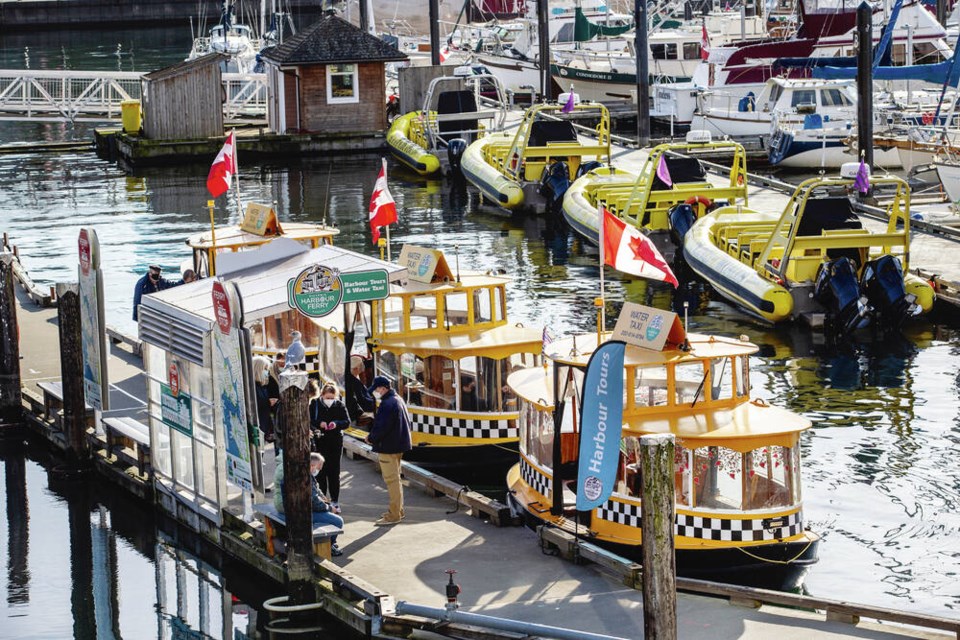Ottawa’s easing of COVID-19 testing for international travellers and B.C.’s return to full-capacity gatherings are expected to propel the Island’s tourism industry out of the pandemic doldrums.
Those who are fully vaccinated will no longer need a molecular COVID-19 test to enter Canada starting Feb. 28. Instead, they will be able to opt for a cheaper, easier-to-get rapid antigen test approved by the country in which it is purchased, provided the test is affiliated with a telehealth service that will verify the user’s identity, supervise the test and provide written documentation.
Molecular tests such as PCR tests, which can cost up to $250, have been considered one of the main deterrents to international travel. Paul Nursey, chief executive of Destination Greater Victoria, called the federal government’s move “vital” for the survival and profitability of the region’s tourism industry. “We just can’t go another year without international travellers,” said Nursey.
He said travel from within Canada has helped keep many operators afloat — barely, in some cases — “but we absolutely need the Americans to make us profitable.”
Nursey said Destination Greater Victoria will launch its “largest ever” marketing campaign targeting the Canadian and U.S. markets on March 1.
For the ferry companies that bring U.S. tourists, easing restrictions is expected to open the floodgates.
“It’s great news, a big development for us,” said Dave Gudgel, chief executive of Clipper Vacations.
The company’s high-speed catamarans usually bring about 250,000 Americans into Victoria each year, but since the pandemic began, the connection with downtown Seattle has been largely sidelined by border closures, then testing requirements.
Gudgel said the Clipper will resume service April 15, and details are being worked out for how rapid tests can be completed and processed. Gudgel said those tests could be done at the Clipper terminal, through the company or a contractor on site, or by travellers booking their tickets before they arrive.
“It will still take a fair amount of time in screening,” said Gudgel, who is nonetheless optimistic there is pent-up demand for cross-border travel.
Ryan Burles, president of Black Ball Ferry Line, which operates the Coho daily from Port Angeles, Washington, to the Inner Harbour, called the federal government’s decision “a lifeline” for ferry operators and the tourism sector.
“It’s a really good step in getting back to normal,” said Burles. “There’s a lot of pent-up demand, especially from people in Washington, Oregon and California. They want to travel.”
Burles is worried, however, that testing requirements will still impede some tourists, especially those travelling to Port Angeles for an 8:20 a.m. sailing to Victoria. He said buying the rapid tests and having them verified, either at local pharmacies or online, will continue to complicate travel plans.
The Coho has been operating since early November, but with only a “trickle” of passengers.
Prior to the pandemic, the vehicle ferry typically brought 475,000 passengers into the harbour over the course of a year, with numbers peaking in the spring and summer.
At Victoria International Airport, a company offering tests charges $70 for an antigen test compared with $175 to $375 for a PCR test, depending on how quickly results are needed.
Accepting antigen tests will eliminate “huge anxiety and uncertainty” among those wanting to travel, said Rod Hunchak, the airport’s director of business development. Hunchak noted passenger numbers had been climbing prior to the arrival of the Omicron variant, and that rise will hopefully resume.
Bill Lewis, manager of the Magnolia Hotel, called the easing of testing requirements and loosening of B.C. restrictions “great steps” toward normalcy for the local economy.
“I think the main thing is these measures are being announced early enough so travellers, particularly our American travellers, can start making some plans for the spring and summer season,” said Lewis. “That ramping-up time is so important for any business, and for the traveller.”
He said the province easing restrictions on gatherings is essential to reviving Victoria’s convention business, and for restaurants constricted by distancing requirements. “We’ve had to turn so many people away, so it will be nice to get back to those conventions, birthdays, anniversaries and special events,” said Lewis.
Ian MacPhee, director of business development for Prince of Whales whale-watching company, also celebrated the potential return of conventions. “Every time there is a great convention, the restaurants are busy, the hotels are busy. People bring their spouses and they go out and do things.”
Ian Robertson, chief executive of the Greater Victoria Harbour Authority, welcomed the federal decision to accept antigen tests, saying it would have been challenging for cruise lines to administer PCR tests.
Making it easier for travellers to come to Victoria will also help boost the bottom line at marinas owned by the harbour authority, he said, while removal of capacity limits means the harbour authority can begin to think about welcoming back festivals and other events.
In a statement, Bruce Williams, CEO of the Greater Victoria Chamber of Commerce, said “many of us are doing a little jig — either in our mind or literally.”
“Let’s keep moving forward and respect each other as we find our footing and our own pace as we begin to step a little lighter.”





.jpg;w=120;h=80;mode=crop)